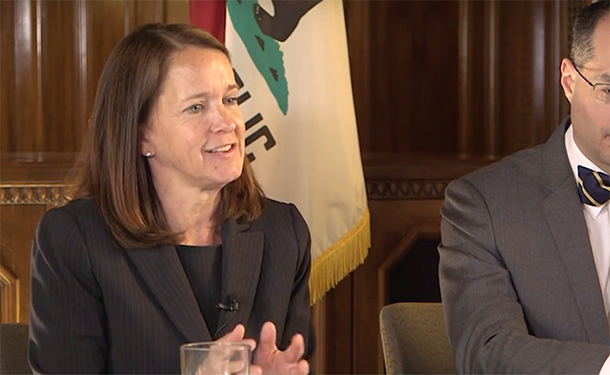
FPPC Chair Jodi Remke (Photo Credit: Angel Cardenas/CA Fwd)
Jodi Remke has been called both a political watchdog and a tough enforcer. Earlier this month she was dubbed one of the most powerful players in state politics–number 46 on Capitol Weekly’s Top 100 list–for her work as chair of the Fair Political Practices Commission (FPPC). Appointed to the position by Governor Jerry Brown in 2014, Remke leads the FPCC in overseeing governmental ethics, lobbying, and campaign finance throughout California.
“The big push for me is ethics,” Remke said, underscoring her passion for her work. Remke has made a substantial career out of helping people to do the right thing. Before joining the FPCC, she spent 14 years enforcing ethical regulations for California’s 258,973 lawyers. Most recently she served as the presiding judge of the State Bar Court.
Coming into the FPPC, Remke established three top priorities: improving transparency through technology, strictly enforcing serious violations, and streamlining and simplifying the law.
Her staff has made significant strides in her two-year tenure. They’ve improved web tools and established e-filing for Form 700 (Statements of Economic Interests) to increase transparency through technology and they continue to hold people accountable when they don’t follow the rules. Her third priority, simplifying the Political Reform Act, which governs regulates California's campaign finance and political ethics rules, is well underway.
“The first time I read the Political Reform Act, I needed help. It took me longer than it should have to understand it,” Remke said. Her comments say more about the 1974 initiative than it does about Remke, who holds a bachelor's degree in political science from the University of Illinois, and her J.D. from McGeorge School of Law, University of the Pacific.
“Most people want to do the right thing,” Remke affirmed. Whether attorneys or politicians, in order to do the right thing, those who are regulated must first understand the rules. The outdated PRA can make compliance difficult. The current law “is far more complex and cumbersome than it should be…it should be intuitive and understandable,” she said.
Modernizing one of the most comprehensive political reform laws in the country is no small task. While the FPPC continues the day-to-day work of overseeing the law, “we realized pretty quickly that we needed to partner up with others,” Remke said of the Political Reform Act Revision Project.
The collaboration included law students from UC Berkeley and UC Davis. “The law school concept gives us legal skills and fresh perspective,” Remke explained. The students, attorneys of tomorrow, have examined the PRA and delivered recommendations for improving and simplifying the law. They have documented perceived contradictions, streamlined content and provided options for making the language more readable.
The next step in the review process is hearing what the public has to say. “Now we’re looking for feedback,” Remke said.
A key partner in the review process, California Forward is engaging with the public to encourage participation in two rounds of public comment on the proposed changes to the PRA.
“I’m excited for the process [and] eager to see what the input is,” said Remke.
Once the insights are assessed and the draft updated, Remke will present a full report to the legislature. “We can proudly say we’ve heard and taken input from all interested parties,” she said.
In looking forward, Remke sees the modernization of the PRA as “a win for public officials and a win for the public.”
Throughout her career, Remke has used her law background to promote compliance and help ensure the public trust. “I think one of the benefits of being a lawyer is that it allows you to try many routes,” she said. From her start at Montana Legal Services Association advocating for victims of domestic abuse through Volunteers in Service to America (VISTA) to her role on the Senate Judiciary Committee to her tenure on the State Bar Court to her current role, Remke has taken that message to heart.

